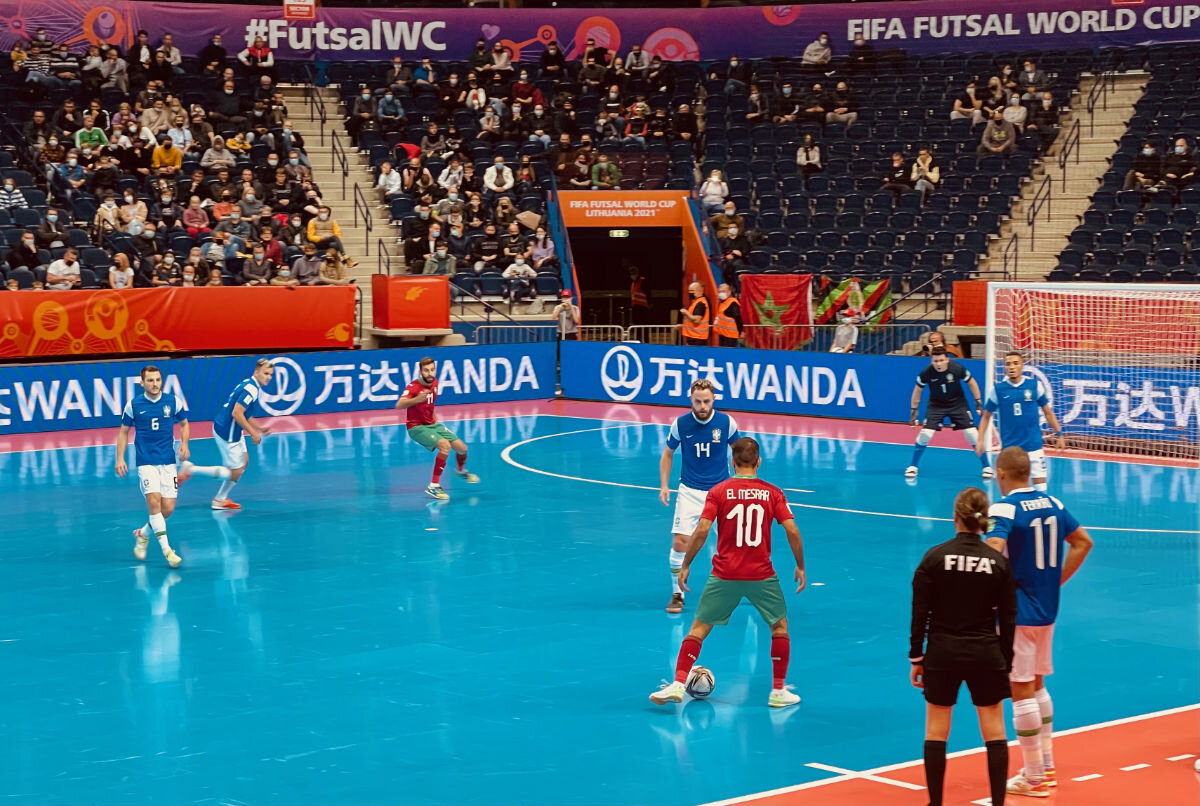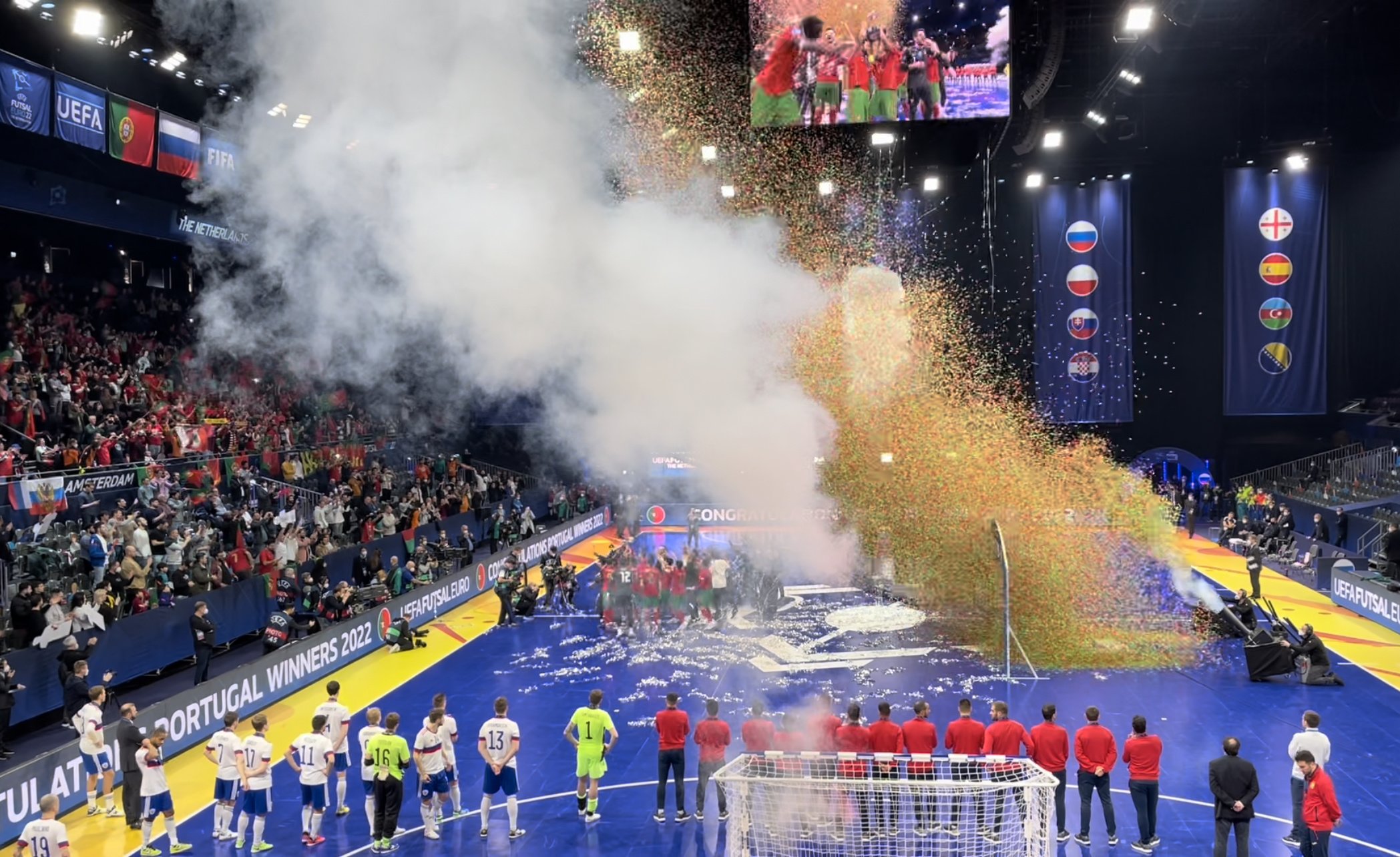‘Where the magic happens’: why small is beautiful in futsal
Day one: Uefa B futsal coaching course
IT’S A TOUCH before 11am. We’d seen no card tricks. No bodies had been apparently sawn in half on the rectangular ocean blue stage before us.
But Mike Skubala is on a roll.
“This is where the magic happens,” he declares, glancing up at a sea of faces eagerly awaiting the stage master’s next move. “Individual techniques plus 2v2 and 3v3 game tactics,” he explains.
The audience is rapt. Nods of approval betray the fact that – as with aspects of the actual supernatural – all movements and value-systems depend on a cabal of firm believers.
I’m one of them.
I can vouch for futsal’s power to supercharge a player’s ability to thrive in the adversity imposed by crushing time and space constraints. Which is why I’m sitting snugly in the cavernous futsal hall at St George’s Park on day one of the FA’s Uefa B futsal coaching course.
We’re listening to Skubala in preparation for the first practical session – an hour of intense court action, with a forensic focus on the building blocks of the game in possession: from 1v1s, 2v1s, 2v2s, 3v2s up to 3v3s.
For the record, Skubala’s coaching sorcery worked wonders. My nagging achilles 49-year-olditis magically vanished under the beguiling spell of his focused “attention to the detail” underpinning his “game model” for player development in futsal. Just the lungs to fix now and I’ll be good as new.
Skubala is a box-office draw. A former England futsal captain, semi-pro footballer and coaching guru at Loughborough University, he was head coach of the England men’s futsal team until it was axed by the FA in a crude act of cost-cutting vandalism in mid-2020. He now works with England’s youth football teams.
Ian Parkes, also a former England futsal captain, is the lead tutor on what is the first indoor course put on by the FA since the Covid-19 pandemic turned our lives upside down. As the FA’s lead liaison with the professional football academies, Parkes supports pro club coaches seeking to get youngsters playing the small-side game.
“Face forward to play forward”
It’s a strange feeling. Not just because no one is wearing a mask. Being back on a course. Indoors. On court. Playing. Chatting. Debating and discussing all things futsal, for the game itself – seriously derailed by the pandemic – and the cliched “football development tool” aspects that so divide connoisseurs of the Fifa-sanctioned small-side game played by an estimated 60 million people around the world.
Ian Parkes, lead FA tutor on the futsal Uefa B coaching course, talks coaches through the principles of his attacking session with under-12s boys Photograph: Jamie Fahey
I’m especially keen to be here. I postponed doing the course in 2018 to write a book: Futsal: The Story of an Indoor Football Revolution. I’m lapping up every splash of tech/tac detail, building on the assorted scraps of knowledge I’ve amassed while coaching, playing and travelling the world speaking to people enmeshed in the history and culture of a game known as the “laboratory of improvisation”in Brazil.
A couple of weeks later I also got to witness futsal at its finest on a trip to Lithuania to see the majestic Ricardinho, nicknamed O Mágico (The Magician), lead Portugal to a first World Cup title, defeating holders Argentina in the final. O Mágico is the embodiment of the high-speed creative intensity on which Skubala and Parkes are shining a spotlight.
“Futsal is bloody quick,” explains Skubala. And it’s the inherent restrictions of time and space that make it an undeniable breeding ground for individual and small-group techniques and tactics that also happen to form the bedrock of creative and imaginative 11-a-side football skills.
This automatic small-group dynamism, inflicting chaos on otherwise orderly defences, is evident week in, week out in the Premier League, whether it’s the potent final-third combination plays of Kevin De Bruyne, Bernardo Silva, Raheem Sterling and Riyad Mahrez at Manchester City or Liverpool’s Firmino, Salah and Mané toying with opponents before slicing them to pieces.
Out on court, the words become actions as we engage in repetitive attacking opportunities, up from 1v1 to 3v3.
“Face forward to play forward,” says Skubala, addressing Jon Kurrant, an England international preparing to receive a pass and go 1v1 at me. After one breathless 2v2 practice Richie Jones, head coach at Welsh futsal champions Cefn Druids, confides in me how it’s a tough gig as he’s not played for a couple of years. I know how he feels. I’ve had 6 weeks of inactivity and it’s killing me.
Throughout the hour, the non-playing coaches observe and tally up what players do before, during and after receiving the ball, with six categories in mind: positioning, movement, timing, disguise, techniques and scanning. It’s an exercise familiar to me from the FA’s Youth Modules in football coaching, introduced in 2009.
The Uefa B course is only five-years-old in England. It’s still evolving.
The before, during and after approach to coach and player development applies to a new FA “game model” for futsal, pulled together by Skubala, which comprises similar but alternative principles of play to those used in football in the same four “moments” of the game: in possession; out of possession; positive and negative transition. It’s all couched in the terms now established as part of the FA’s England DNA but the futsal coaching paradigm reserves places in its squad for special situations (fly goalkeeper and 4v3) and set plays (corners, kick-ins).
“The 1s, the 2v2s, 3v3s, this is the place where we need to spend our time focusing,” says Skubala after the session. “Sometimes we get too focused on the game strategies and formations without spending enough time on these first.”
We break for lunch with a riot of technical information buzzing around in our minds. It’s a brilliant start, I think to myself.
Given that the course costs £740 per person – £300 more than I’ve ever paid for a course at the FA – it’s only right that the quality is high.
Unfortunately, lunch was the day’s biggest disappointment. I say “lunch”. But there was none. Every previous coaching course I’ve taken at St George’s Park has included a sit-down meal at the hotel restaurant. Not so, this time. And the Dugout eatery in the Football Centre was closed so we had to put our movement, timing, and scanning techniques to good use by driving out to a nearby garage to forage for a cheese butty and a packet of crisps.
“Make the ball move quickly”
In the afternoon session Parkes puts on a practice with a bunch of grassroots under-12s players from Nottingham. It’s excellent. Parkes whispers the kids through it, praising, encouraging and imploring them to “play in the future” by trying to receive in a position to attack.
“Make the ball move quickly,” he urges, more than once, in a statement that translates the language of attacking principles and tech/tac detail used by Skubala for a more youthful audience.
The 30 adult candidates in the room today are a mixed bunch. Like me, Rav Bhatti and Nick Barton coach “grassroots” futsal as well as football. They live a few miles from my home in Reading. We vow to organise matches with our adult teams – a golden opportunity given the dearth of adult futsal leagues below national league level in the Berks and Bucks FA region.
Mary Pacitti coaches at the youth futsal and football Escolla academy, based in the south-east. She tells me she’s ecstatic about getting on the course.
I get chatting to Carl Pennifold, a coach at Chichester University, and Bruno Duarte, who grew up immersed in futsal in Portugal and now coaches in Leicester. We’re talking about how coaching futsal – as opposed to football – has changed our coaching approach. We agree on one thing: the power to simplify what can be a riot of competing and complicated messages in such a tactically complex sport is the holy grail.
We feel we’re getting there but recognise this course is a chance to drill down and make the complex simple.
It’s the art of teaching any subject.
Another candidate, Lewis Cann, owns a futsal coaching company in Newcastle. When I'm having a discussion about managing individual player development in a team context with Ciaran Donaghy, a Northern Ireland international player and coach, I notice John Tapia Owens, the well-regarded head coach of Jon Kurrant’s team, the England’s National Futsal Series big-hitters, London Bloomsbury.
Football coaches are well represented too. This is England, after all. And at the FA, futsal’s player development links to football – while undeniable – are always front and centre despite only being half the story.
Futsal is a bona fide, Fifa-sanctioned sport in its own right, originating in Uruguay in 1930 and spreading throughout South America like a feral weed. In 2021, 140 of the 211 Fifa nations have a men’s team and 55 a women’s side too. England have neither.
“It’s entirely up to you what you focus on with your players … but we’ll be asking ‘why’ you did what you did”
Izzy Keighley says she wants to use knowledge gleaned on the course in her role as head coach of Manchester United Foundation, where futsal can play a much bigger role. Rob Williams, head of coach development at Shrewsbury Town FC, readily offers his views on player development in a pro football context.
Suddenly, as if by magic, at a few minutes shy of 4pm, the day is done.
Parkes and Skubala wrap up by reminding us of the tasks to come: as well as the six practical days over eight months, four e-learning modules and five online discussions in groups of five, we will be assessed on completion of a 12-week programme of training sessions and matches with our teams – two of which must be recorded. An interview on its merits will follow.
“It’s entirely up to you what you focus on with your players … but we’ll be asking ‘why’ you did what you did,” explains Parkes.
Sounds fair enough. With this, I depart, hungry to devour more futsal coaching morsels next time. And with a bit of luck, maybe even a bit of actual food thrown in.
Uefa B day one: 5 key coaching points
In 1v1, when receiving, face forward to play forward … remember the touchline is an extra defender
Most goals are scored from 2-player combinations. There are (at least) 26 ways to combine in a 2v2
“Stay in the light” as a support player to keep open passing lines
In attack try to occupy all four vertical four zones: width and depth are vital
Three Rs of the FA Youth Awards (realism, relevance and repetition) are still coaching gold
Have something to share? Add your comment below.





















MIGUEL RODRIGO is ready for his last dance with Thailand. The globe-trotting Spanish tactician reveals his futsal inspirations plus hopes and predictions for the World Cup in Uzbekistan